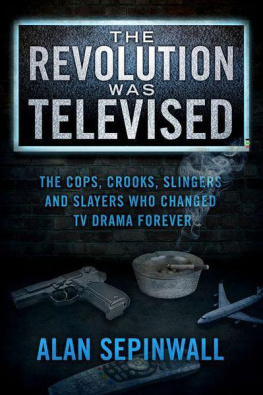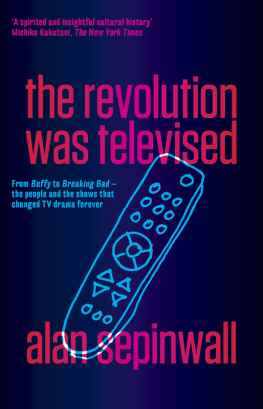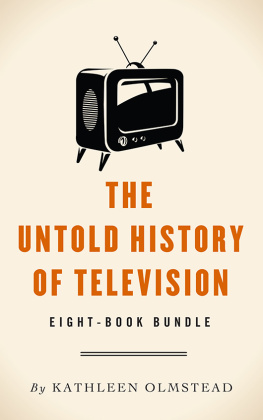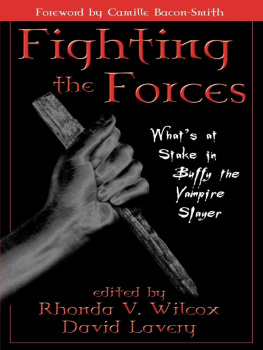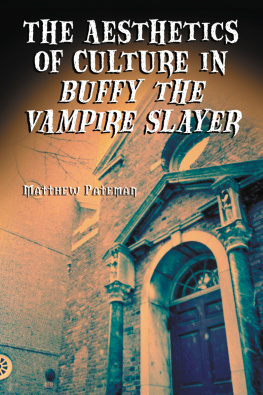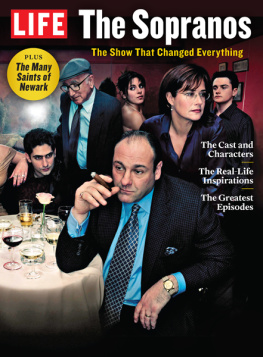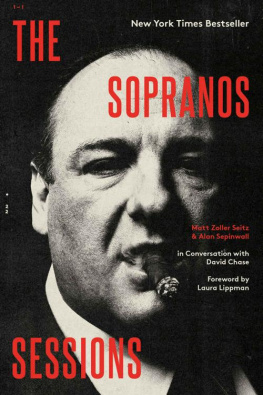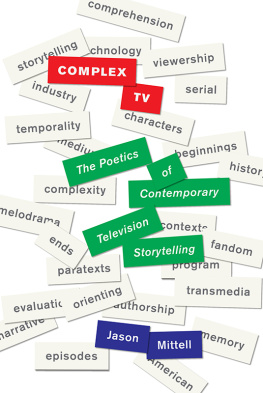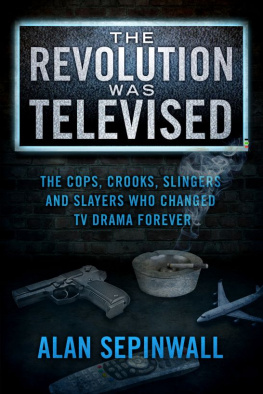The Revolution Was Televised
The Cops, Crooks,
Slingers and Slayers
Who Changed TV
Drama Forever
By Alan Sepinwall
Copyright 2012 by Alan Sepinwall. All rights reserved.
This book is dedicated to two people I dearly wish were still here to read it:
Dr. Jerry Sepinwall, who always encouraged my love of reading and writing.
David Mills, who gave me my first peek behind the curtain.
Table of Contents
ue Lets be careful out there The shows that paved the way
Prologue
Lets be careful out there
The shows that paved the way
Theres already a school of thought one that a book like this admittedly plays into arguing that true quality television didnt exist before The Sopranos . But while the adventures of Tony Soprano and the many complicated characters who followed him elevated TV to another level of both quality and cultural respect, they didnt come out of thin air. The millennial wave of revolutionary dramas was built on the work put in by a group of other series, particularly the ones created from the early 80s onward(*). Here are some of the crucial building blocks for the revolution:
(*) And even there, I would accept the argument from older TV historians that Im leaving out significant even-earlier work. David Chase learned his craft writing for The Rockford Files , for instance, even if The Sopranos has only a passing resemblance to it, and there were many important dramas in the 50s and 60s. But from my point of view, theres a more tangible connection between, say, Hill Street Blues and The Wire than between The Defenders and Breaking Bad .
Hill Street Blues (NBC, 1981-1987): One night in our college dorm, a friend of ours admitted she had never seen Casablanca , a hole in her cultural memory we aimed to fill in as quickly as possible. To our dismay, she spent most of the movie complaining about how predictable and clichd it all was, and our arguments that it had invented most of those clichs fell on deaf ears.
Thats the danger with coming to a classic late: if a work is good enough, the rest of the entertainment industry will strip-mine it until the original work somehow seems derivative of the others that blatantly copied it. And I imagine if you were to show an episode of Hill Street Blues to someone who came of age with The Wire , theyd react to it about as favorably as our friend did to Casablanca . But in 1981, Steven Bochco and Michael Kozoll and, later, writers like David Milch and Jeffrey Lewis took every assumption viewers had about primetime dramas in general and cop shows in particular and turned each one its ear.
Previous TV dramas tended to tell simple, easily digestible stories that began and ended within the space of an hour, featuring clear good guys and bad guys, that played on your emotions but rarely taxed your brain or your moral compass. With Hill Street Blues , nothing was ever simple.
The series took place in a run-down police precinct where the cops were fighting a holding action against the ever-increasing amount of gang violence and other brutal crime, while the police commissioner and local politicians preferred to act like the entire neighborhood would be better off forgotten. Stories didnt begin and end neatly within the space of not indelible? Well, yeah, ngcar an hour, but would continue for weeks on end, sometimes over an entire season. Though there was a clear central character in Daniel J. Travantis righteous precinct captain Frank Furillo, the narrative bounced around constantly among a huge, diverse cast. Scenes might begin by focusing on one character, then immediately shift their attention to a different character who passed him in the hallway, then flip around to yet a third set of characters before cutting away to the next location. Furillo was for the most part a virtuous hero, but the other characters existed along a wide moral spectrum, and even Frank had his moments of weakness. The show mixed bleak drama with a twisted sense of humor (undercover cop Mick Belker had a tendency to growl and bite suspects), and the violence, language, and sex scenes were all considered fairly graphic for TV of the period.
Much of Hill Street would seem incredibly tame today, yet it feels less dated than a 30-year-old drama should. It was such a huge step forward in terms of what TV drama could do with complex narratives of moral shades of grey that you can still find strands of its DNA in many dramas being made today both the ones Ill be talking about in this book, and less edgy material like Greys Anatomy and the CSI shows so it still feels very much a part of the current era. Without Hill Street Blues, maybe another show makes the evolutionary leap that eventually brings us to Don Draper and Walter White. Or maybe were still watching simplistic, easy-to-digest dramas, even on HBO.
St. Elsewhere (NBC, 1982-1988): This hospital drama was so close in its chaotic style and cynicism to Hill Street Blues that it could have been a spin-off. But where St. Elsewhere distinguished itself, and blazed a trail for many that followed, was with its willingness to experiment with its own structure and even level of reality. At various points, St. Elsewhere did a two-parter flashing back over 50 years of history at the hospital; an episode involving a patient who believed himself to be Mary Richards from The Mary Tyler Moore Show (who ran into both Betty White playing a new role and Jack Riley as his character from The Bob Newhart Show ); an episode where the doctors went to Cheers to have a beer and be insulted by Carla; and another where Howie Mandels character was shot and journeyed between Hell, Purgatory, and Heaven (where he met a God who looked an awful lot like Howie Mandel).
St. Elsewhere not only proved that the formal chaos of Hill Street Blues could be transplanted to another setting and creative team, but that your characters, your stories, and your world didnt have to be confined to a familiar box. You could take your audience anywhere, if you did it well enough. St. Elsewhere also set the bar very high or very low, depending on your point of view for memorable, challenging series finales. The closing scene revealed that the entire series had been the fantasy of the autistic son of the shows main character, who spent his days staring at a snow globe containing the hospitals familiar exterior. Some fans were dazzled by it; others felt it was the show judging them harshly for having watched it all these years. (Tommy even places the globe on top of the TV set right before we fade out.) It neatly presaged many of the anger-inducing finales to come in the 21st century.
Cheers (NBC, 1982-1993): Stick with me on this one. The through line from Sam Malone to Al News Corp. president Peter Cherninved, Swearengen might seem tenuous, other than that they both ran bars, but I believe Glen and Les Charles and their writing staff were responsible for a crucial step in the evolution of how people watched television. Hill Street Blues and St. Elsewhere were critical darlings, but modestly-rated. Cheers was a flop itself at first, but eventually became one of the most popular sitcoms of all time and it did it while hooking viewers on an ongoing narrative about the on-again, off-again, on-again relationship between Sam and Diane, and later Sam and Rebecca, Rebecca and Robin Colcord, etc. Cheers wasnt weaving some kind of elaborate tapestry where you would be lost if you hadnt seen the previous 13 episodes. But the sitcom as a genre had to that point with rare exceptions (like the seasons of I Love Lucy where they traveled through Europe or stayed in Hollywood) been a form where each episode was self-contained, designed to exist independently from the one before and the one after. Cheers was a show that was always aware of what had already happened to its characters, and that built both jokes and important character beats serially on that. The shows success paved the way for even more heavily-serialized sitcoms like Friends and Seinfeld (and later many of the HBO comedies, Arrested Development , The Office , Parks and Recreation , etc.). It also helped condition viewers to the basic idea that their TV shows werent disposable, that it was possible to see characters transform beyond just seeing sitcom kids get older with each season.
Next page
